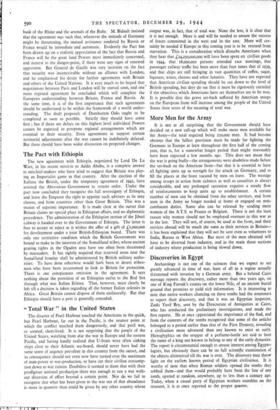The Pact with Ethiopia The new agreement with Ethiopia, negotiated
by Lord De La Warr, in his recent mission to Addis Ababa, is a complete answer to mischief-makers who have tried to suggest that Britain was play- ing an Imperialist game in that country. After the ejection of the Italians the British, under the temporary agreement of 1942, have assisted the Abyssinian Government to testore order. Under the pact now concluded they recognise the full sovereignty of Ethiopia, and leave the Emperor the right to appoint such advisers as he may choose, and from countries other than Great Britain. This was a matter of supreme importance. It is made clear at the outset that Britain claims no special place in Ethiopian affairs, and no diplomatic precedence. The administration of the Ethiopian section of the Jibuti railway is handed over to the Government of Ethiopia. The latter is free to accept or reject as it wishes the offer of a gift of D,000,000 for development under a joint British-Ethiopian board. There was only one restrictive condition which the British Government was bound to make in the interests of the Somaliland tribes, whose ancient grazing rights in the Ogaden area have too often been threatened by marauders. It has rightly required that reserved areas near the Somaliland frontier shall be administered by British military autho- rities. To have done otherwise would have been to desert tribes- men who have been accustomed to look to Britain for protection. There is one conspicuous omission in the agreement. It says nothing about the provision of an Ethiopian outlet to the Red Sea through what was Italian Eritrea. That, however, must clearly be left till a decision is taken regarding all the former Italian colonies in Africa. Great Britain cannot dispose of them unilaterally. But that Ethiopia should have a port is generally conceded.


























 Previous page
Previous page